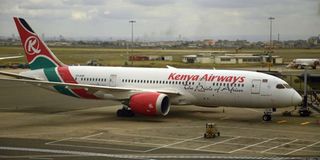Premium
Support for nationalising Kenya Airways reflects State’s good will

A Kenya Airways plane. The national carrier staff row will be settled out of court.
What you need to know:
- Some of the world’s largest carriers, such as Delta Airlines and British Airways recently reported losses worth billions in the second quarter of this year, leading to thousands of job cuts.
Recent calls by employees of Kenya Airways for our government to nationalise the carrier came as no surprise to many. The economic state of the airline has been severely impacted as a result of the Covid-19 pandemic and the significant reduction in air travels.
The aviation industry has been one of the hardest hit sectors globally.
Some of the world’s largest carriers, such as Delta Airlines and British Airways recently reported losses worth billions in the second quarter of this year, leading to thousands of job cuts.
As has been the case with many industries in our country which have been negatively affected by the pandemic, including agriculture and tourism, employees of the aviation industry have turned to our national leadership for help. The primary concern of course is regarding the ability of Kenya Airways employees to support their families should job cuts be instituted.
Furthermore, the future of Kenyan aviation more generally is also at stake, with many employees who are let go potentially moving to foreign carriers. Many of these are employees are specialists in their field, if we lost them, they may not return.
Parliament this week voted in favour of the nationalisation proposal. President Uhuru Kenyatta and his Transport Cabinet Secretary James Macharia, however, still need to comprehensively determine how to go about the process.
This is an issue our government considers at the top of its agenda, given the over 4,000 families who depend on the survival of Kenya Airways. Nationalisation of such a large entity of course takes time and must be done with precision if the move is to be effective in rectifying the airlines economic predicament.
In a recent interview, the Principal Secretary for Transport, Esther Koimett expressed the willingness of the government to assist in resolving this crisis as quickly as possible stating, “The government is keen to take a consolidated view of aviation assets of the country in order to make sure they work in a coherent and efficient way to support the hub”. The current financial debt of the airline as well as the 8 per cent stake owned by Air France-KLM makes this process even more difficult.
In order to support the struggling airline, the government has put in place a number of measures. These will help keep the company afloat until the precise details of the privatisation plan can be hammered out. Some of these measures include exempting the airline from paying excise duty on goods such as jet fuel as well as offering a host of tax concessions. Measures such as these are indeed exceptional, particularly at a time when the government is struggling for revenue.
Furthermore, the government has offered to assist in settling the airlines debts to local lenders who purchased equity in the company during its 2017 restructuring. Considering the huge amount of money government needed to allocate to Covid-19 related financial measures, creative ideas have been proposed to underwrite this plan. One such idea has been funding the nationalisation through the issuing of 10-year government bonds.
These moves have been supported by the transport committee which is helping oversee this process. The government’s commitment to save Kenya Airlines has been placed on top of the agenda both due to the citizens who would be affected by its going bankrupt as well as the obvious symbolic considerations. With the internationalisation of air travel, even without a national carrier, our country would have no lack of airlines flying to and from Kenya. Rather, this commitment stems first and foremost from the dependency of those 4,000 families on Kenya Airways for their livelihood. The move is a tough one, but it should be commended.
Aside from the human cost, the government understands the value of our country having its own national carrier. Kenya is the pride of Africa. And President Kenyatta has, on more than one occasion, displayed what has been referred to by the president himself as “pragmatic nationalism” to keep us in the lead. Expanding beyond mere conversations about national pride, this pragmatic nationalism seeks to actively support institutions of value. Pride breeds excellence.
This was most recently seen in legislation he advocated for to support athletes in our country and particularly those that compete on the international stage. Preserving symbols of national importance during these challenging times will ensure the continued blossoming of our national ethos – and our national progress – for years to come.
Mr Mugolla is a public policy analyst. [email protected]





